 POLITICS
POLITICS In Which Big Sister Is Watching You
 Wednesday, May 20, 2009 at 6:38PM
Wednesday, May 20, 2009 at 6:38PM 
Whittaker Chambers and Ayn Rand
We will save the larger question of Whittaker Chambers, a man who a great many young people don't even know, and who if he was still alive would have to be preserved in the Smithsonian in some way, for another time. There are no people like Whittaker now, and eventually all the people who knew of Whittaker Chambers' life will die. There is no life like his, it is impossible to be as present in historical time the way that he was unless you're Angelina Jolie or the guy who writes SWPL.
In the following essay, Whittaker Chambers, on behalf of William F. Buckley's conservative movement (it differed from its antecedents in its rejection of anti-Semitism, racism, and other kooky ideas) put down the vastly popular work of the greatest propagandist of her time, Ayn Rand.
What her God-fearing foes seemed to miss, and what Whittaker Chambers willfully ignores in this National Review piece from 1957 is that The Fountainhead and Atlas Shrugged are soap operas with a solid message: You can be great. As for his criticisms of Rand's style, we will say this: she is more readable and interesting than the Bible, by the grace of his lordship John Galt.
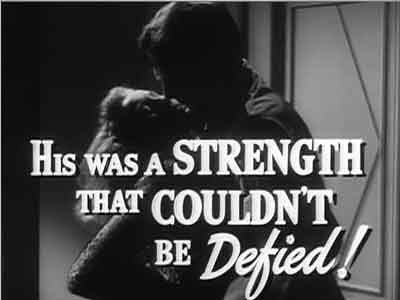
the atlasphere: date a fellow rand admirer
That's not to say Ayn wasn't an acquired taste. The Russian immigrant to the U.S. who spent most of her life in New York was stubborn as hell. As Bennett Cerf, who worked with Ayn on Atlas, remembered:
Atlas Shrugged was being edited by Hiram Haydn. The hero, John Galt, makes a speech that lasts about thirty-eight pages. All that he says in it has been said over and over already in the book, but Hiram couldn’t get her to cut a word. . . . I said, “Ayn, nobody’s going to read that. You’ve said it all three or four times before, and it’s thirty-odd pages long. You’ve got to cut it.” She looked at me calmly and said, “Would you cut the Bible?” So I gave up.
Whatever you think of her, Rand has inspired more people to great things than you have.

After William F. Buckley published this review, Rand would walk out of any room he walked into. In his book Cruising Speed, he recalls her saying in their first meeting, "But you are too smart to beleef in Gad!"
Whatever you think of the review, the last line is the finest in all of book reviewing.
Big Sister is Watching You
by Whittaker Chambers
Several years ago, Miss Ayn Rand wrote The Fountainhead. Despite a generally poor press, it is said to have sold some four hundred thousand copies. Thus, it became a wonder of the book trade of a kind that publishers dream about after taxes. So Atlas Shrugged (Random House, $6.95) had a first printing of one hundred thousand copies. It appears to be slowly climbing the best seller lists.
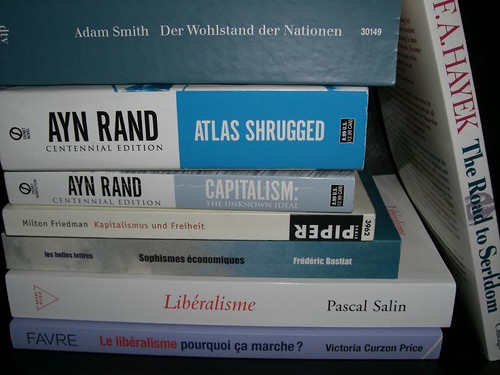
Civilization is the progress toward a society of privacy. The savage's whole existence is public, ruled by the laws of his tribe. Civilization is the process of setting man free from men.
The news about this book seems to me to be that any ordinarily sensible head could possibly take it seriously, and that apparently, a good many do. Somebody has called it: "Excruciatingly awful." I find it a remarkably silly book. It is certainly a bumptious one. Its story is preposterous. It reports the final stages of a final conflict (locale: chiefly the United States, some indefinite years hence) between the harried ranks of free enterprise and the "looters." These are proponents of proscriptive taxes. Government ownership, Labor, etc. etc. The mischief here is that the author, dodging into fiction, nevertheless counts on your reading it as political reality. "This," she is saying in effect, "is how things really are. These are the real issues, the real sides. Only your blindness keeps you from seeing it, which, happily, I have come to rescue you from."
Since a great many of us dislike much that Miss Rand dislikes, quite as heartily as she does, many incline to take her at her word. It is the more persuasive, in some quarters, because the author deals wholly in the blackest blacks and the whitest whites.
In this fiction everything, everybody, is either all good or all bad, without any of those intermediate shades which, in life, complicate reality and perplex the eye that seeks to probe it truly. This kind of simplifying pattern, of course, gives charm to most primitive story-telling.
And, in fact, the somewhat ferro-concrete fairy tale the author pours here is, basically, the old one known as: The War between the Children of Light and the Children of Darkness. In modern dress, it is a class war. Both sides of it are caricatures.

alger hiss, communist
The Children of Light are largely operatic caricatures. In so far as any of them suggests anything known to the business community, they resemble the occasional curmudgeon millionaire, tales about whose outrageously crude and shrewd eccentricities sometimes provide the lighter moments in Board rooms. Otherwise, the Children of Light are geniuses.
One of them is named (the only smile you see will be your own): Francisco Domingo Carlos Andres Sebastian d'Antonio. This electrifying youth is the world's biggest copper tycoon. Another, no less electrifying, is named: Ragnar Danesjold. He becomes a twentieth-century pirate.
All Miss Rand's chief heroes are also breathtakingly beautiful. So is her heroine (she is rather fetchingly vice-president in charge of management of a transcontinental railroad). So much radiant energy might seem to serve an eugenic purpose. For, in this story as in Mark Twain's, "all the knights marry the princess"— though without benefit of clergy.
Yet from the impromptu and surprisingly gymnastic matings of heroine and three of the heroes, no children— it suddenly strikes you— ever result. The possibility is never entertained. And indeed, the strenuously sterile world of Atlas Shrugged is scarcely a place for children.
You speculate that, in life, children probably irk the author and may make her uneasy. How could it be otherwise when she admiringly names a banker character (by what seems to me a humorless master-stroke): Midas Mulligan?
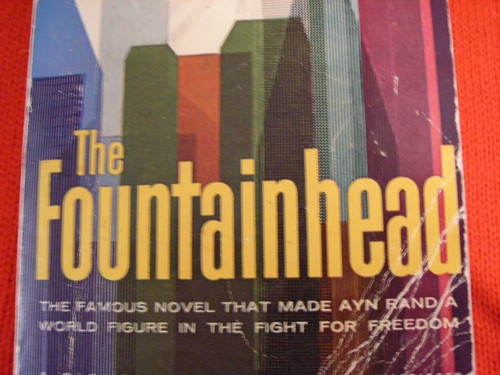
making ayn required reading: I think I just found my new bank
You may fool some adults, you can't fool little boys and girls with such stuff— not for long. They may not know just what is out of line, but they stir uneasily.
The Children of Darkness are caricatures, too; and they are really oozy. But at least they are caricatures of something identifiable. Their archetypes are Left Liberals, New Dealers, Welfare Statists, One Worlders, or, at any rate, such ogreish semblances of these as may stalk the nightmares of those who think little about people as people, but tend to think a great deal in labels and effigies. (And neither Right nor Left, be it noted in passing, has a monopoly of such dreamers, though the horrors in their nightmares wear radically different masks and labels.)

the author, testifying.
In Atlas Shrugged, all this debased inhuman riffraff is lumped as "looters." This is a fairly inspired epithet. It enables the author to skewer on one invective word everything and everybody that she fears and hates. This spares here the plaguy business of performing one service that her fiction might have performed. Namely: that of examining in human depth how so feeble a lot came to exist at all, let alone be powerful enough to be worth hating and fearing. Instead, she bundles them into one undifferentiated damnation.
"Looters" loot because they believe in Robin Hood, and have a lot of other people believing in him, too. Robin Hood is the author's image of absolute evil— robbing the strong (and hence good) to give to the weak (and hence no good). All "looters" are base, envious, twisted, malignant minds, motivated wholly by greed for power, combined with the lust of the weak to tear down the strong, out of a deep-seated hatred of life and secret longing for destruction and death. There happens to be a tiny (repeat: tiny) seed of truth in this. The full clinical diagnosis can be read into the pages of Friedich Nietzsche.
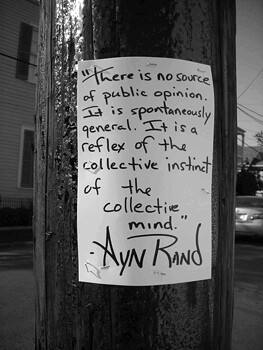
andrew stuttaford's brilliant essay on rand in the new york sun
(Here I must break in with an aside. Miss Rand acknowledges a grudging debt to one, and only one, earlier philosopher: Aristotle. I submit that she is indebted, and much more heavily, to Nietzche. Just as her operatic businessmen are, in fact, Nietzschean supermen, so her ulcerous Leftists are Nietzsche's "last men," both deformed in a way to sicken the fastidious recluse of Sils Maria. And much else comes, consciously on not, from the same source.)
Happily, in Atlas Shrugged (though not in life), all the children of Darkness are utterly incompetent.
So the Children of Light win handily by declaring a general strike of brains, of which they have a monopoly, letting the world go, literally, to smash. In the end, they troop out of their Rocky Mountain hideaway to repossess the ruins. It is then, in the book's last line, that a character traces in the air, "over the desolate earth," the Sign of the Dollar, in lieu of the Sign of the Cross, and in token that a suitably prostrate mankind is at last ready, for its sins, to be redeemed from the related evils of religion and social reform (the "mysticism of mind" and the "mysticism of muscle").

from here
That Dollar Sign is not merely provocative, though we sense a sophomoric intent to raise the pious hair on susceptible heads. More importantly, it is meant to seal the fact that mankind is ready to submit abjectly to an elite of technocrats, and their accessories, in a New Order, enlightened and instructed by Miss Rand's ideas that the good life is one which "has resolved personal worth into exchange value," "has left no other nexus between man and man than naked self-interest, than callous 'cash payment.'" The author is explicit, in fact deafening, about these prerequisites.
Lest you should be in any doubt after 1168 pages, she assures you with a final stamp of the foot in a postscript: "and I mean it." But the words quoted above are those of Karl Marx. He, too, admired "naked self-interest" (in its time and place), and for much of the same reasons as Miss Rand: because, he believed, it cleared away the cobwebs of religion and led to prodigies of industrial and cognate accomplishment.
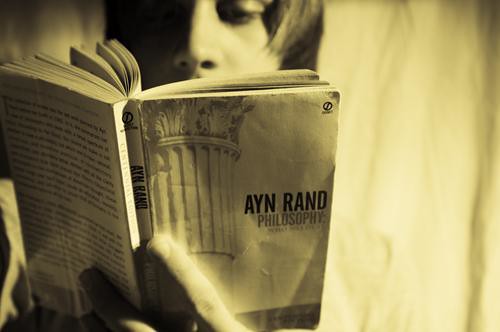
rand and the movies
The overlap is not as incongruous as it looks. Atlas Shrugged can be called a novel only by devaluing the term. It is a massive tract for the times. Its story merely serves Miss Rand to get the customers inside the tent. And as a soapbox for delivering her Message.
terry teachout's magnificent essay on ayn
"Lithium" - The Polyphonic Spree (mp3)
The Message is the thing. It is a sum, a forthright philosophic materialism. Upperclassmen might incline to sniff and say that the author has, with vast effort, contrived a simple materialist system, one, intellectually, at about the state of the oxcart, though without mastering the principle of the wheel. Like any consistent materialism, this one begins by rejecting God, religion, original sin, etc. etc. (This book's aggressive atheism and rather unbuttoned "higher morality," which chiefly outrage some readers, are, in fact, secondary ripples, and result inevitably from its underpinning premises.) Thus, Randian Man, like Marxian Man, is made the center of a godless world.

Ayn Rand: As Astonishing As Elvis
At that point, in any materialism, the main possibilities open up to Man.
1) His tragic fate becomes, without God, more tragic and much lonelier. In general, the tragedy deepens according to the degree of pessimism or stoicism with which he conducts his "hopeless encounter between human questioning and the silent universe." Or,
2) Man's fate ceases to be tragic at all. Tragedy is bypassed by the pursuit of happiness. Tragedy is henceforth pointless. Henceforth man's fate, without God, is up to him. And to him alone. His happiness, is strict materialist terms, lies with his own workaday hands and ingenious brain. His happiness becomes, in Miss Rand's words, "the moral purpose of his life."
Here occurs a little rub whose effects are just as observable in a free enterprise system, which is in practice materialist (whatever else it claims or supposes itself to be), as they would be under an atheist Socialism, if one were ever to deliver that material abundance that all promise. The rub is that the pursuit of happiness, as an end in itself, tends automatically, and widely, to be replaced by the pursuit of pleasure with a consequent general softening of the fibers of will, intelligence on "man as a heroic being" "with productive achievement as his noblest activity."
For, if man's "heroism" (some will prefer to say: "human dignity") no longer derives from God, or is not a function of that godless integrity which was a root of Nietzsche's anguish, then Man becomes merely the most consuming of animals, with glut as the condition of his happiness. And this, of course, suits the author's economics and the politics that must arise from them.
For politics, of course, arise, though the author of Atlas Shrugged stares stonily past them, as if this book were not what, in fact it is, essentially— a political book. And here begins mischief. Systems of philosophic materialism, so long as they merely circle outside this world's atmosphere, matter little to most of us. The trouble is that they keep coming down to earth. It is when a system of materialist ideas presumes to give positive answers to real problems of our real life that mischief starts.
In an age like ours, in which a highly complex technological society is everywhere in a high state of instability, such answers however philosophic, translate quickly into political realities. And in the degree to which problems of complexity and instability are most bewildering to masses of men, a temptation sets in to let some species of Big Brother solve and supervise them.
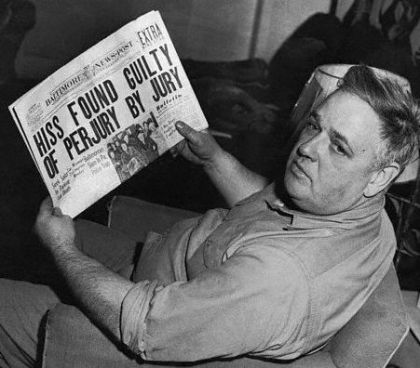
Whittaker Chambers receiving the news of Alger Hiss' conviction
One Big Brother is of course, a socializing elite (as we know, several cut-rate brands are on the shelves). Miss Rand, as the enemy of any socializing force, calls in a Big Brother of her own contriving to do battle with the other. In the name of free enterprise, therefore, she plumps for a technocratic elite (I find no more inclusive word than technocratic to bracket the industrial-financial-engineering caste she seems to have in mind).
When she calls "productive achievement" man's "noblest activity," she means, almost exclusively, technological achievement, supervised by such a managerial political bureau. She might object that she means much, much more; and we can freely entertain her objections. But in sum, that is just what she means. For that is what, in reality, it works out to.
And in reality, too, by contrast, with fiction, this can only head into a dictatorship, however benign, living and acting beyond good and evil, a law unto itself (as Miss Rand believes it should be), and feeling any restraint on itself as, in practice, criminal, and, in morals, vicious— as Miss Rand clearly feels it to be. Of course, Miss Rand nowhere calls for a dictatorship. I take her to be calling for an aristocracy of talents. We cannot labor here why, in the modern world, the pre-conditions for aristocracy, an organic growth, no longer exist, so that impulse toward aristocracy always emerges now in the form of dictatorship.
Nor has the author, apparently, brooded on the degree to which, in a wicked world, a materialism of the Right and a materialism of the Left, first surprisingly resemble, then in action tend to blend each with each, because, while differing at the top in avowed purposed, and possibly in conflict there, at bottom they are much the same thing. The embarrassing similarities between Hitler's National Socialism and Stalin's brand of Communism are familiar. For the world, as seen in materialist view from the Left. The question becomes chiefly: who is to run that world in whose interests, or perhaps, at best, who can run it more efficiently?
Something of this implication is fixed in the book's dictatorial tone, which is much its most striking feature. Out of a lifetime of reading, I can recall no other book in which a tone of overriding arrogance was so implacably sustained. Its shrillness is without reprieve. Its dogmatism is without appeal.

the ayn rand inspired college
In addition, the mind, which finds this one natural to it, shares other characteristics of its type.
1) It consistently mistakes raw force for strength, and the rawer the force, the more reverent the posture of the mind before it.
2) It supposes itself to be the bringer of a final revelation.
Therefore, resistance to the Message cannot be tolerated because disagreement can never be merely honest, prudent or just humanly fallible. Dissent from revelation so final (because, the author would say, so reasonable) can only be willfully wicked. There are ways of dealing with such wickedness, and, in fact, right reason itself enjoins them.
From almost any page of Atlas Shrugged, a voice can be heard, from painful necessity, commanding: "To the gas chambers— go!" The same inflexibly self-righteous stance results, too (in the total absence of any saving humor), in odd extravagances of inflection and gesture— that Dollar Sign, for example. At first, we try to tell ourselves that these are just lapses, that this mind has, somehow, mislaid the discriminating knack that most of us pray will warn us in time of the differences between what is effective and firm, and what is wildly grotesque and excessive.
Soon we suspect something worse. We suspect that this mind finds, precisely in extravagance, some exalting merit; feels a surging release of power and passion precisely in smashing up the house. A tornado might feel this way, or Carrie Nation.

David Boaz on Ayn
We struggle to be just. For we cannot help feel at least a sympathetic pain before the sheer labor, discipline and patient craftsmanship that went to making this mountain of words. But the words keep shouting us down. In the end that tone dominates. But it should be its own antidote, warning us that anything it shouts is best taken with the usual reservations with which we might sip a patent medicine. Some may like the flavor. In any case, the brew is probably without lasting ill effects. But it is not a cure for anything. Nor would we, ordinarily, place much confidence in the diagnosis of a doctor who supposes that the Hippocratic Oath is a kind of curse.
From National Review, December 28, 1957, pp. 594-596
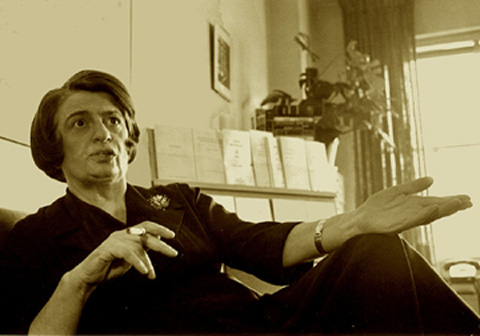






























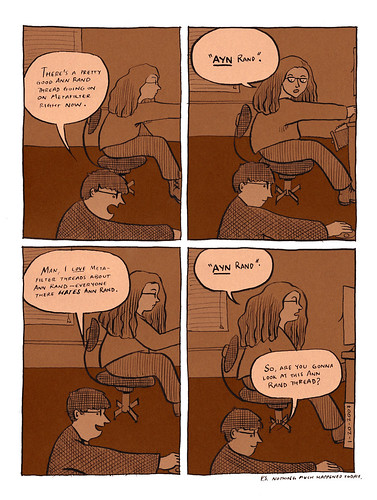
Reader Comments (4)
You know whose favorite author is Ayn Rand? Angelina Jolie. Mull on that, righty.
[...] NPH FTW!!! I’d like Paul Verhoeven to remake Showgirls with NPH as Nomi Malone. I love (fascist parable) Starship Troopers like Alex loves Ayn Rand. [...]
[...] last allowed you to appreciate the man, the myth, the legend Whittaker Chambers when he took apart Ayn Rand. I don’t really agree with much of what he writes in that review; it strikes me that [...]
Great blog guys!
Oliver
www.thefourohfive.com